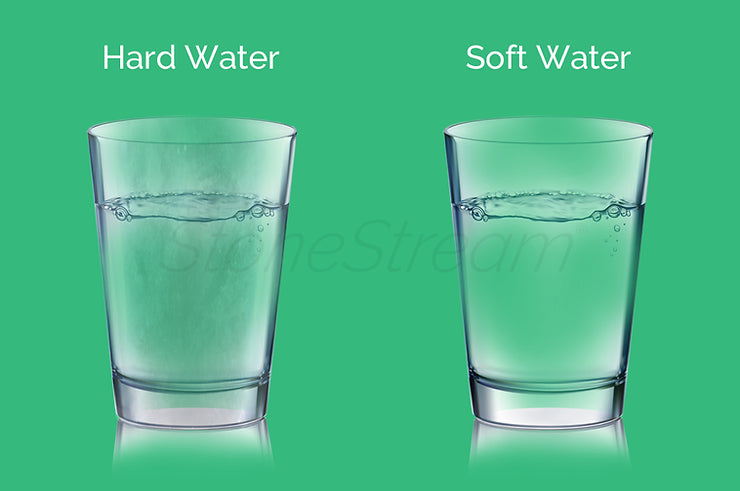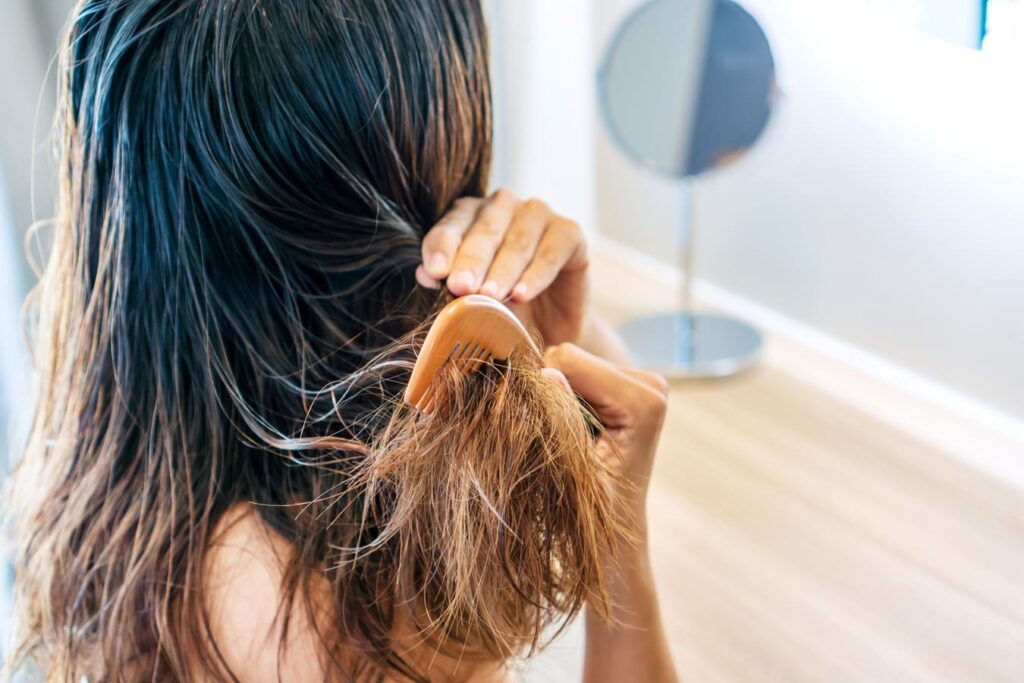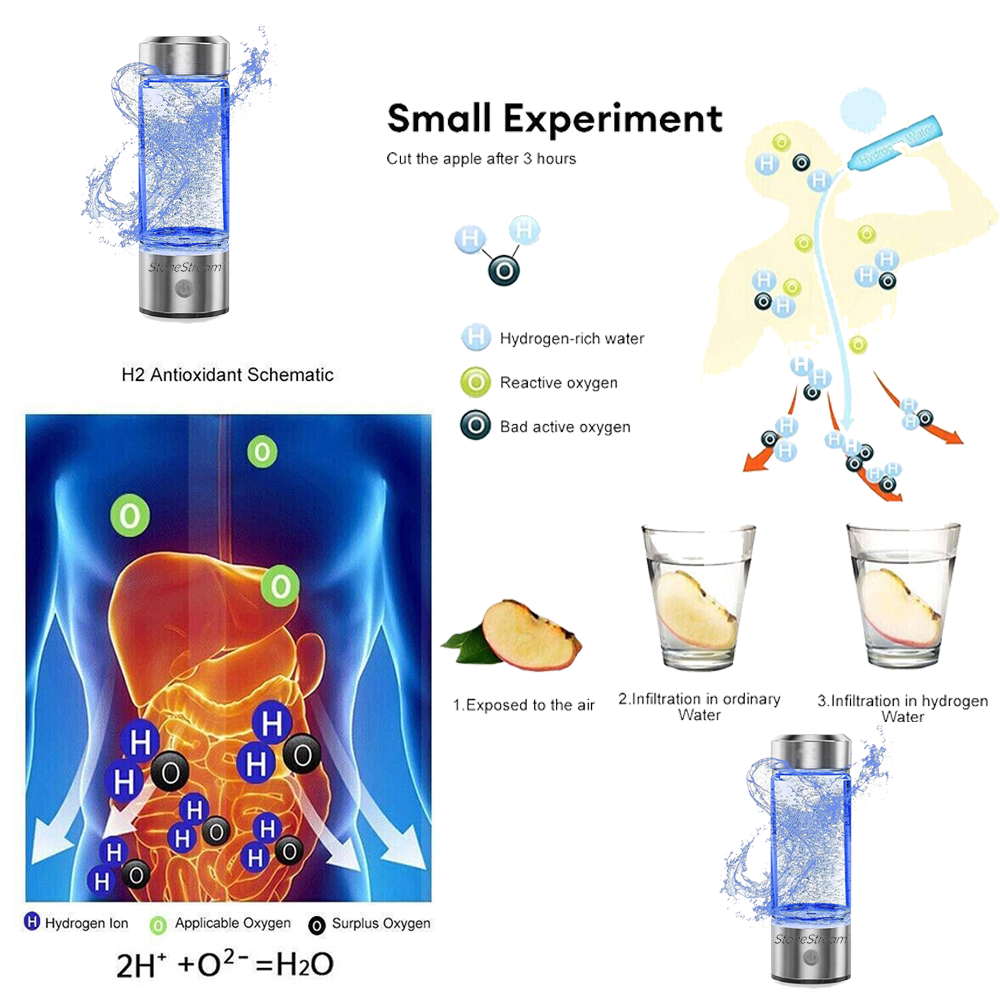Want an uncomplicated explanation? Hard water has dissolved minerals in it whereas soft water doesn’t.
Wait! It can’t be as easy as that, surely? You’re right. It’s not. Stay with us and you’ll find out the differences between hard and soft water and how you can improve your domestic hard water situation.
What Are ‘Hard’ and ‘Soft’ Water?
Water that falls as rain is naturally soft because it comes straight from the clouds. The raindrops dissolve the gases or particles that are in the air, but they don’t make rainwater hard.
The important differences between hard water and soft water depend on the underlying geology of the area where the rain falls. If the rain falls on slate, granite, clay, or other impermeable rock, then very few minerals, if any, will dissolve in the water. This is classified as ‘soft’ water.
If the rocks are permeable like limestone or chalk, the water will contain dissolved calcium and magnesium minerals (among others) and be classified as ‘hard’ water.
Underground aquifers store water in permeable rocks between the rock grains, giving even more chance to dissolve minerals. On the other hand, impermeable rocks tend to shed the surface water into streams, rivers, lakes, and reservoirs.
How Can You Tell Which is Which?
Well, because hard water contains dissolved minerals rather than suspended particles, you can’t usually tell just by looking. Inspect a glass of hard or soft water and both types seem to be exactly the same!
But they’re not!
What Are the Differences?
So, we already know that you can’t tell the difference just by looking at the water. But, you can tell the difference by looking at the water’s effects:
-
When hard water evaporates or dries, dissolved minerals stay behind as a precipitate.
-
The dissolved minerals in hard water will come in contact with other types of materials and sometimes chemically react with them.
Let’s Look at the Effects of Hard Water.
If you live in a hard water area and you unload your dishwasher, you might see white spots on the glassware. These are deposits of calcium carbonate that are formed when the water dries out on smooth surfaces.
Likewise, you might see mineral stains on clothes that come out of the washing machine. Hard water is harsher than soft water since it has suspended abrasive limescale particles. So, clothes wear out a lot faster after being washed with hard water regularly.
When you take a bath or wash clothes with hard water, you might feel a gritty film on your hands and face. Why does this happen? The chemical reaction between calcium carbonate and soap forms a scum which settles out of the solution. You thus may need to wash for longer and rinse more often if you have hard water
The unfortunate fact is that washing with hard water contributes to dry and itchy skin. If you wash your hair with hard water, your scalp will feel dry and your hair will appear dull. Dissolved minerals change your skin’s pH balance (i.e. whether your skin is acid or alkaline). Because of hard water and the mineral deposits they leave behind, the natural oils in your skin don’t do their job properly — this can lead to the growth of harmful bacteria. Eczema sufferers are particularly susceptible to this since their skin is already quite sensitive.
In case you aren’t sure about pH levels, given below is a simple chart showing typical pH values of everyday substances.

Simply put, pure water has a pH of 7 (neutral). Rain and soft water are slightly acidic with a pH between 7 and 6.5. This depends on how much dissolved carbon dioxide and sulphur dioxide have been absorbed by the rainwater from the atmosphere. Hard water, on the other hand, is alkaline with a pH level between 7 and 8.5.
When your domestic water heating system heats hard water, a small amount evaporates, causing the dissolved minerals to precipitate. The solids settle as limescale on water heating elements and accumulate on the inside of pipes.
Remember that sedimented limescale causes a few problems of its own.
-
Limescale in itself isn’t dangerous to health, but it can harbour harmful bacteria that will contaminate your domestic water if they’re left to multiply. It will also reduce the lifespan of your shower heads and shower accessories. Here's how you can descale your shower head.
-
Limescale reduces the water flow to appliances and taps. If you have a low pressure shower head, chances are that it's due to limescale buildup! Engineers have designed their appliances to work at an optimum water flow rate and pressure. So, when the pipe diameter changes, the efficiency of the appliances drops considerably.
-
Limescale building up on heating elements in showers, washing machines, dishwashers, and kettles decreases the efficiency of the element. This results in higher electricity usage and bills.
Soft Water is Different
Detergent soap produces a good lather with soft water — this is how it is able to do its job properly when cleaning clothes and crockery. Similarly, washing your body with soft water allows the soap to do its job and doesn’t leave behind chalky precipitates or scum.
When you use soft water, clothes end up cleaner and with no mineral stains. They also don’t suffer from the abrasiveness of hard water precipitate.
With soft water, limescale doesn’t form on pipes or heating elements allowing your various appliances to work at their optimum efficiency. Additionally, the pH of your skin doesn’t change much with soft water, thus preventing attacks from harmful bacteria.
How Can We Make Hard Water Soft?
Wondering how to change hard water into soft water? Softening hard water and reducing its harmful effects is relatively easy. You just need to remove the dissolved calcium and magnesium minerals.
There are two ways to do this — either reduce the water hardness as it enters your property using an ion-exchange column or reduce the water hardness at each appliance so that only soft water exits the system.
Fitting ion exchange equipment into the domestic water circuit can be a major task, especially if the water pipework is hidden and out of view. This is okay if you’re building a new house as the equipment can be incorporated into the architect’s drawings. However, if you’re retrofitting water conditioning equipment, you should ideally fit it into every outlet.
Luckily, appliances such as dishwashers and washing machines have a built-in ion-exchange column for softening water. All you have to do is add water softening salt. Other appliances, like showers, don’t usually have protection but shower heads sometimes have a water softening column. These are in the form of replaceable filter cartridges, but they aren’t always compatible with all shower fittings.
StoneStream shower heads incorporate a filter to remove waterborne particles but also have an optional package to remove hard water minerals. Rather than topping up a salt container like in your dishwasher, you just need to replace the cartridge when it's about to run out, usually between 6 and 10 months, depending on the condition of your domestic water. They also have a higher thermal efficiency than others so you’ll reduce any heat losses across the shower head.
The shower head isn’t the only place in your home to use conditioned water. The water delivered to the taps on the kitchen sink, bathroom basin, and bathtub should ideally use softened and filtered water too.
If you’re a keen gardener, you should be careful that you aren’t watering the garden with water containing too many chemicals. After all, flowers and vegetables are meant to drink soft rainwater, not hard or chlorinated domestic water. You can buy many types of water filters and conditioners designed for those applications. You can even buy one for the garden hose, although usually allowing tap water to stand for a day or so should be enough to remove chlorine.
If you decide to just treat your shower water, however, don’t forget that you might need to install a separate filter such as our universal shower hard water filter to remove as many impurities as possible. This includes not just particles like rust, dirt, and limescale but also chlorine, sand, and heavy metals.
StoneStream Universal ShowerHead Water Filter

Buy Now
What's Next?
If you live in a hard water area or your domestic water contains impurities, it’s a good idea to fit water conditioning units wherever you can. Ideally, installing a conditioning unit where the water enters your property is the way to go. If you can’t do that, install one under the kitchen sink and route the conditioned water to a separate tap for drinking water and washing food. Using specialist water conditioning units will reduce a build-up of limescale around shower head spray holes and around taps. They will also help increase your water flow rate back to where it should be.
It’s also worth looking at StoneStream's products to see if they can help you improve your showering experience. We have some of the best water softening shower heads and shower replacement filters on the market. Happy showering!
StoneStream EcoPower ShowerHead

Buy Now



